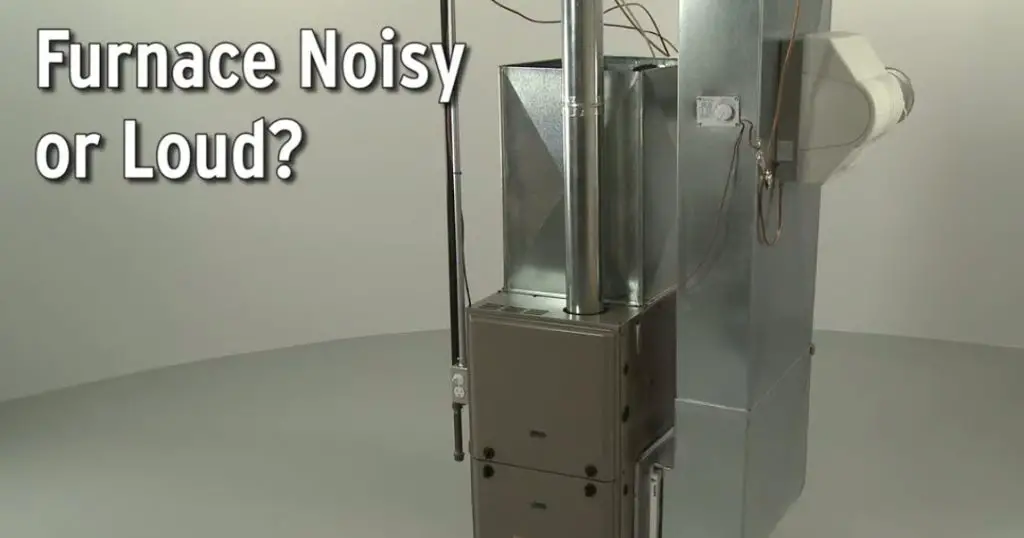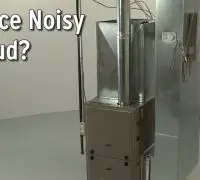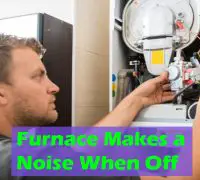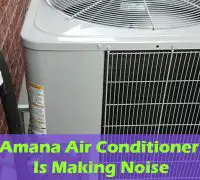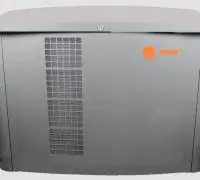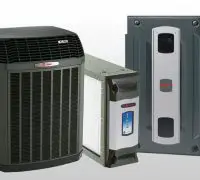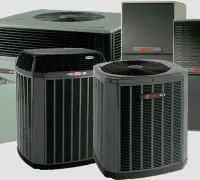If you turn on your gas furnace and hear a loud banging or a thumping noise coming from it, you probably suspect a problem with your furnace. Such loud noises (or any noises for that matter) can be quite concerning and you cannot postpone investigating the furnace.
Furnaces are probably the most popular appliances for heating homes in the US. Even if you don’t need to deal with loud noises on your furnace, many homeowners had to deal with it at some point.
Page Table of Contents
What’s the most common cause for a loud noise when turning the furnace on?
Even if several things can make your furnace loud when you turn it on, a delayed ignition is the most common. The following information will help you understand what delayed ignition is and what you can do to fix it and prevent the system from further damage.
What is delayed ignition?
When the thermostat informs the furnace to turn on, the gas valve will open and send gas to the furnace’s burners for ignition. When the gas doesn’t ignite right away, delayed ignition will occur. The delay lets the gas build up in the furnace. Even if it eventually ignites, it will also generate a small explosion inside the furnace!
The mini-explosion can damage the furnace and pose a fire risk in your home. It goes without saying that you should call a certified HVAC contractor for furnace servicing the moment you hear the loud banging noise.
Why does the delayed ignition take place?
Commonly, delayed ignition takes place when you turn on the furnace after you haven’t used it for many months. When you don’t use the furnace for a long time, moisture can collect and corrode the firebox inside the furnace. If there’s a lot of corrosion inside the furnace, it will block the lines supplying gas to the burners. Should the lines be stopped, the burners won’t get enough gas to ignite right away.
Rus and corrosion are the main reasons the furnace’s gas lines get blocked. However, they’re not the only factors. Skipping regular maintenance and cleaning of your furnace will make dust, lint, and sulfur deposit on the gas lines. One of the natural byproducts when burning natural gas is sulfur. When it builds up, it looks like a powdery white substance on the burners’ surfaces or the pilot light.
Your furnace could experience a delaying ignition for other reasons as well:
- Not enough gas at the burners due to a low gas supply pressure
- Too much air combined with gas, so it’s difficult to ignite
- Blocked, dirty, or weak pilot light (it happens with old furnaces)
- The burners are dirty or misaligned
Can you avoid delayed ignition?
Now that you know the basics of delayed ignition, it’s natural to see if it can be avoided with a furnace. The most important thing to do is clean the furnace before you turn it on after a long break. You should contact an experienced HVAC technician and have him clean the burners and gas lines to remove dust, rust, lint, or sulfur buildup that possibly obstruct ignition and generate a delay.
Cleaning a gas furnace is dangerous and tricky and it’s a job better left to the professionals. The longer you wait to use the furnace, the higher the risk of the gas line becoming clogged. As a result, the furnace will fail to ignite at all.
What should other loud noises be concerning?
Weird noises from the furnaces aren’t that unusual. Tiny little pops or hums are regular noises that happen when a furnace operates. However, if the noises are louder than usual and you notice new noises, it’s definitely time to contact a certified HVAC technician. Maintenance work or repairs could be necessary. Along with the banging and thumping, some other furnace noises should make you look into your furnace.
Popping and banging noises
When the heat moves through the furnace and into the ducts right after a new cycle begins, the warm air comes in contact with the cold metal of the ducts. While the metal warms, it will expand. The expansion will generate the loud popping or banging noise you think comes from the furnace. So it would help if you ensured that the loud noises came from the furnace itself and not from the ducts.
Expanding ducts are expected when a heating system such as the furnace operates. Unsecured ductwork, poor duct system design, and closed vents may cause loud noises. Therefore, you should inspect the vents inside the house and see that they’re all open and not blocked. Should you believe that it’s the ductwork causing the loud furnace noises, we recommend you call the pros for further assistance with the ducts. Repairs or alterations to the ducts might be necessary.
Clicking
It’s actually normal to hear a clicking noise when you turn the furnace on and off your furnace. However, when the clicking noise continues, something could be faulty. The relay, wiring, gas, ignition, or even electrical control might be defective, so you need to call the professionals.
Clicking noises can occur due to various issues:
- A defective thermocouple no longer detects the flame, so it shuts the gas valve to prevent a gas leak
- The pilot flame is out, or it’s not in the correct position. It can happen because the mixing of air and gas is poor. The thermocouple will close the gas valve because it won’t detect the flame.
- The gas valve doesn’t open because it doesn’t have enough energy. A defective ignition board, a faulty valve, or a poor connection between the components could cause insufficient power in the gas valve.
If you hear a loud clicking when the gas furnace tries to start, you should turn off the furnace and call the pros. They will identify the cause and proceed accordingly.
Rattling
A loose cover panel or a few loose screws can make the furnace rattle loud when you turn it on. Rattling noises are tricky as they can hide a more severe issue with the furnace. A malfunction in the furnace’s motor and even a leak in the heat exchanger can cause a loud rattling noise in when furnace.
Scraping
If a loud scraping noise comes from your furnace when you turn it on, it means that the blower wheel has a problem. The scraping noise appears when a wheel has fallen, got loose, or broken entirely.
Squealing
When you turn on the furnace, a squealing sound can signal that the blower belt or even the blower motor got defective. Sometimes, squealing happens when the bearings require oiling.
Conclusion
Even if some of the loud noises don’t signal severe problems with your furnace, you should never leave it like that, hoping that the problem will solve on its own. Stay on the safe side and contact a certified HVAC technician if you hear loud noises from the furnace when you turn it on. Professional cleaning and inspection is the best thing to do for your furnace.
